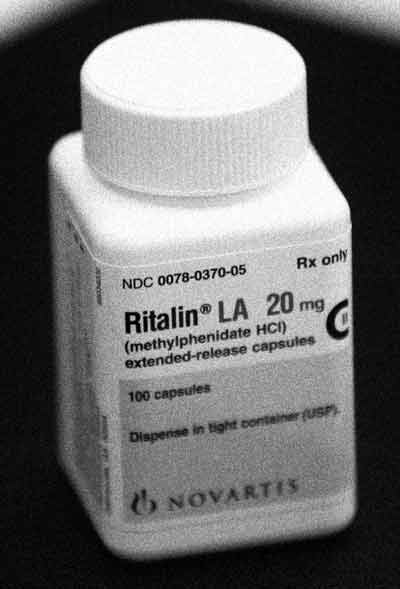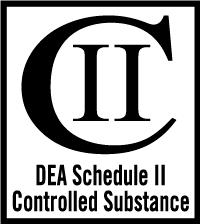Amphetamines, Neurotoxicity and Brain Decay
A clinical study funded by the National Institutes of Health found amphetamines damage brain cells needed for cognitive speed and function.


DEA Schedule II Control Substance means this drug has a “high potential for abuse” that “may lead to severe psychological or physical dependence,” and the federal government sets limits on the amount that may be manufactured each year.
The Food and Drug Administration (FDA) requires the following “black box” warning on all methylphenidate drugs, including Ritalin, which means that medical studies indicate Ritalin carries a significant risk of serious, or even life-threatening, adverse effects.
RITALIN-SR IS A FEDERALLY CONTROLLED SUBSTANCE (CII) BECAUSE IT CAN BE ABUSED OR LEAD TO DEPENDENCE. KEEP RITALIN-SR IN A SAFE PLACE TO PREVENT MISUSE AND ABUSE. SELLING OR GIVING AWAY RITALIN-SR MAY HARM OTHERS, AND IS AGAINST THE LAW.
TELL YOUR DOCTOR IF YOU OR YOUR CHILD HAVE (OR HAVE A FAMILY HISTORY OF) EVER ABUSED OR BEEN DEPENDENT ON ALCOHOL, PRESCRIPTION MEDICINES OR STREET DRUGS.
Ritalin works by initiating the acute stress response (“fight or flight” response). The central nervous system prepares the body for physical action by creating physiological changes as if it were stressed or under threat. These changes include:
Methylphenidate (Ritalin) was first synthesized in 1944 in an (unsuccessful) attempt to create a stimulant that would not induce addiction or tolerance. Ritalin is very closely related to amphetamine— similar in chemical structure, metabolization and clinical effects. This close connection is the chief reason Ritalin use raises concern among patients and others.
“Of particular concern is that ADHD literature prepared for public consumption does not address the potential or actual abuse of methylphenidate. Instead, methylphenidate is routinely portrayed as a benign, mild substance that is not associated with abuse or serious side effects. In reality, however, the scientific literature indicates that methylphenidate [Ritalin] shares the same abuse potential as other Schedule II stimulants. Further, case reports document that methylphenidate abuse can lead to tolerance and severe psychological dependence.”
You have high blood pressure or any form of heart disease, are very nervous or have severe insomnia, have a history of addiction to drugs or alcohol. Do not combine with monoamine oxidase inhibitors.
A study of children (average age, 11 years) found 9 months of methylphenidate (Ritalin) use caused a reduction in the anterior chamber depth, which has been described as a powerful predictor of angle closure glaucoma.
Another study found a 10-year-old boy developed cataracts and glaucoma after 2 years of methylphenidate (Ritalin) use.
Researchers concluded, “methylphenidate treatment even in short duration, and low doses may effect intraocular pressure.”
In a 2013 drug-safety announcement, the FDA announced that drugs containing methylphenidate (Ritalin, Concerta, Daytrana, Focalin, Metadate, Methylin, Quillivant) must including warnings about the risk of priapism. It's a serious problem. Priapism is a persistent, usually painful, erection that lasts for more than four hours and occurs without sexual stimulation. If the condition is not treated immediately, it can lead to scarring and permanent erectile dysfunction.
The FDA included an even stronger warning about atomoxetine (Strattera): “Priapism appears to be more common in patients taking atomoxetine than in patients taking methylphenidate products. Health care professionals should be cautious when considering changing patients from methylphenidate to atomoxetine (Strattera).”
The safety warning also raised concerns about links between priapism and amphetamine drugs, which include Adderall, Dexedrine, ProCentra and Vyvanse.
Ritalin has been extensively abused. Extreme psychological dependence and severe social disability have resulted. Abuse of Ritalin may cause a sudden heart attack—even in those with no signs of heart disease. Symptoms of overdose that require immediate medical assistance include:
It is possible to build up a tolerance to methylphenidate, which means the person using the drug needs to take larger doses to achieve the same effect. Over time, the body might come to depend on methylphenidate drugs just to function normally. The person craves the drug and their psychological dependence makes them panic if access is denied, even temporarily.
Withdrawal symptoms can include tiredness, panic attacks, crankiness, extreme hunger, depression and nightmares. Some people experience a pattern of “binge crash” characterized by using continuously for several days without sleep, followed by a period of heavy sleeping.
The drug should be stopped gradually. Withdrawal symptoms are psychological and stopping suddenly can cause extreme fatigue and severe, even suicidal, depression in adult patients.
“Also, in addition to increasing heart rate and blood pressure, causing insomnia and weight loss, and sometimes causing psychotic symptoms, the stimulant medications used for ADHD (methylphenidate and amphetamines) may cause heart disease if taken for a long time. The latter problem led to a debate within the FDA, well covered by newspapers, about whether to issue a special warning to doctors. In the end, the FDA decided not to do this, but the risk remains,” reports Jack M. Gorman, M.D., professor of psychiatry at Columbia University and deputy director of the New York State Psychiatric Institute. Ritalin “is a very powerful drug that undoubtedly works for ADHD, but there are alternatives with less abuse potential that should be tried first.”
Ritalin LA releases two peak levels of methylphenidate per day:
Ritalin SR delivers methylphenidate into the blood more slowly and continuous over a 6-8 hour period.
| Methylphenidate or Ritalin SR | Ritalin LA |
|---|---|
| 10 mg methylphenidate twice-per-day | 20 mg Ritalin LA once-per-day |
| 20 mg Ritalin SR twice-per-day | 20 mg Ritalin LA once-per-day |
| 15 mg methylphenidate twice-per-day | 30 mg Ritalin LA once-per-day |
| 20 mg methylphenidate twice-per-day | 40 mg Ritalin LA once-per-day |
| 40 mg Ritalin SR twice-per-day | 40 mg Ritalin LA once-per-day |
| 30 mg methylphenidate twice-per-day | 60 mg Ritalin LA once-per-day |
| 60 mg Ritalin SR twice-per-day | 60 mg Ritalin LA once-per-day |
The NY Times, in an op-ed article by L. Alan Sroufe, a professor emeritus of psychology at the University of Minnesota's Institute of Child Development, stated the following:
“Attention-deficit drugs increase concentration in the short term, which is why they work so well for college students cramming for exams. But when given to children over long periods of time, they neither improve school achievement nor reduce behavior problems. The drugs can also have serious side effects... Many parents who take their children off the drugs find that behavior worsens, which most likely confirms their belief that the drugs work. But the behavior worsens because the children's bodies have become adapted to the drug. Adults may have similar reactions if they suddenly cut back on coffee, or stop smoking.”
Parents might want to consider another approach.
Ongoing research shows early-life use of Ritalin (methylphenidate) has complex effects that endure later into life. A study published in Biological Psychiatry suggests that exposure of Ritalin in youth may later disrupt development of brain cells in the hippocampus, region of the brain critical to memory, spatial navigation, and behavioral inhibition and resulting in memory problems, disorientation and depression in adulthood.
Damage caused by Ritalin is the same as seen in Alzheimer's disease where the hippocampus is one of the first areas of the brain to suffer damage so memory problems and disorientation appear among the first symptoms.
| BRAND | GENERIC |
|---|---|
| Concerta | methylphenidate hydrochloride (HCI) [extended release] |
| Daytrana | methylphenidate film, transdermal [extended release] |
| Focalin | dextro-methylphenidate (or, dexmethylphenidate) hydrochloride (HCI) [instant release] |
| Focalin XR | dextro-methylphenidate hydrochloride (HCI) or dexmethylphenidate hydrochloride (HCI) [extended release] |
| Metadate CD | methylphenidate hydrochloride (HCI) [extended release: ONE-a-day] |
| Metadate ER | methylphenidate hydrochloride (HCI) [extended release: TWO- or THREE-a-day] |
| Methylin | methylphenidate hydrochloride [instant release] |
| Methylin ER | methylphenidate hydrochloride [extended release] |
| Quillivant XR | methylphenidate hydrochloride [extended release; liquid] |
| Ritalin | methylphenidate hydrochloride (HCI) [instant release] |
| Ritalin LA | methylphenidate hydrochloride (HCI) [extended release: one-a-day, rapid onset with two peak levels] |
| Ritalin SR | methylphenidate hydrochloride (HCI) [extended release: one-a-day, slower onset with more continuous delivery] |
| Attenta† | methylphenidate hydrochloride (HCI) [instant release]; AU |
| Biphentin† | methylphenidate hydrochloride (HCI) [extended release]; CA |
| Equasym† | methylphenidate hydrochloride (HCI) [instant release]; EU |
| Equasym XL† | methylphenidate hydrochloride (HCI) [extended release]; EU |
| Motiron† | methylphenidate hydrochloride (HCI) [instant release]; EU |
| Rubifen† | methylphenidate hydrochloride (HCI) [instant release]; NZ |
| Vyvanse | dextroamphetamine with lysine (lisdexamfetamine) [extended release] |
The following have been reported with use of RITALIN-SR and other stimulant medicines.
1. Heart-related problems:
Tell your doctor if you or your child have any heart problems, heart defects, high blood pressure, or a family history of these problems. Your doctor should check you or your child carefully for heart problems before starting RITALIN-SR.
Your doctor should check you or your child's blood pressure and heart rate regularly during treatment with RITALIN-SR.
Call your doctor right away if you or your child has any signs of heart problems such as chest pain, shortness of breath, or fainting while taking RITALIN-SR.
2. Mental (Psychiatric) problems:
All Patients
Children and Teenagers
Tell your doctor about any mental problems you or your child have, or about a family history of suicide, bipolar illness, or depression.
Call your doctor right away if you or your child have any new or worsening mental symptoms or problems while taking RITALIN-SR, especially seeing or hearing things that are not real, believing things that are not real, or are suspicious.
A clinical study funded by the National Institutes of Health found amphetamines damage brain cells needed for cognitive speed and function.
Like athletes who use steroids, students who use Adderall to enhance academic performance are in many ways victims.
Although Vyvanse is referred to as “pro-drug” of dextroamphetamine, it's still an amphetamine, meaning that it's easily abused and can cause insomnia, agitation, anxiety and sometimes psychotic symptoms like seeing things or becoming paranoid.
Most people may not know that Strattera (atomoxetine) appears to cause unsatisfactory sexual function (decreased libido, ejaculatory problems and impotence).